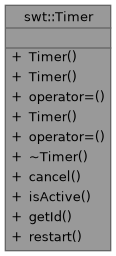RAII timer wrapper with boost-style API and move semantics. More...
#include <Timer.h>

Public Member Functions | |
| Timer (TimerId id, std::weak_ptr< SLLooper > looper) | |
| Constructor - creates timer handle. | |
| Timer (const Timer &)=delete | |
| Copy constructor - deleted (move-only semantics) | |
| Timer & | operator= (const Timer &)=delete |
| Copy assignment - deleted (move-only semantics) | |
| Timer (Timer &&other) noexcept | |
| Move constructor - transfers timer ownership. | |
| Timer & | operator= (Timer &&other) noexcept |
| Move assignment - transfers timer ownership. | |
| ~Timer () | |
| Destructor - automatic timer cleanup. | |
| void | cancel () |
| Cancel the timer. | |
| bool | isActive () const |
| Check if timer is currently active. | |
| TimerId | getId () const |
| Get unique timer identifier. | |
| void | restart (uint64_t delay_ms) |
| Restart timer with new delay (one-shot timers only) | |
Friends | |
| class | SLLooper |
| Friend class declaration for internal access. | |
Detailed Description
RAII timer wrapper with boost-style API and move semantics.
Timer provides a safe, RAII-based interface for managing kernel timers. Key characteristics:
- RAII lifecycle: Automatic cleanup when Timer object is destroyed
- Move-only semantics: Prevents accidental copying and ensures unique ownership
- Thread-safe operations: Safe cancellation and status checking across threads
- Boost-style API: Familiar interface for timer operations
The Timer class acts as a handle to an underlying kernel timer managed by TimerManager. It ensures proper cleanup and provides safe access to timer operations even when the timer is moved between objects.
- Note
- Timer objects are move-only and cannot be copied
- Warning
- Accessing moved-from Timer objects results in no-op operations
- See also
- SLLooper::addTimer, Timer, TimerManager
Constructor & Destructor Documentation
◆ Timer() [1/3]
Constructor - creates timer handle.
- Parameters
-
id Unique timer identifier from TimerManager looper Weak reference to parent SLLooper instance
Creates a Timer handle that manages the lifecycle of a kernel timer. The weak_ptr prevents circular dependencies with the parent SLLooper.
- Note
- Typically called internally by SLLooper::addTimer
◆ Timer() [2/3]
|
delete |
Copy constructor - deleted (move-only semantics)
Timer objects cannot be copied to ensure unique ownership of the underlying kernel timer resource.
◆ Timer() [3/3]
|
noexcept |
Move constructor - transfers timer ownership.
- Parameters
-
other Timer object to move from
Safely transfers ownership of the underlying timer:
- Copies timer ID and looper reference
- Transfers cancellation state
- Marks source object as moved-from
- Updates TimerManager's internal pointer to new location
- Note
- Source timer becomes invalid after move
- Thread-safe operation with atomic flags
◆ ~Timer()
| swt::Timer::~Timer | ( | ) |
Member Function Documentation
◆ cancel()
| void swt::Timer::cancel | ( | ) |
Cancel the timer.
Cancels the underlying kernel timer and prevents future callback execution. Safe to call multiple times - subsequent calls are no-ops.
- Note
- Thread-safe operation
- No-op if timer has been moved from
- Safe to call even if timer has already expired
- See also
- Timer::cancel
Definition at line 59 of file Timer.cpp.
Referenced by ~Timer().

◆ getId()
|
inline |
Get unique timer identifier.
- Returns
- TimerId for this timer instance
Returns the unique identifier assigned by TimerManager. Useful for debugging and logging purposes.
- Note
- Safe to call on moved-from objects (returns original ID)
- See also
- Timer::getId
◆ isActive()
| bool swt::Timer::isActive | ( | ) | const |
Check if timer is currently active.
- Returns
- true if timer is active and not cancelled, false otherwise
Returns timer status by checking both local cancellation flag and TimerManager's internal state. A timer is considered active if:
- It hasn't been cancelled locally
- It exists in TimerManager's active timer map
- Timer object hasn't been moved from
- Note
- Thread-safe operation
- Returns false for moved-from timer objects
- See also
- Timer::isActive
Definition at line 75 of file Timer.cpp.
Referenced by swt::SLLooper::addPeriodicTimer(), and swt::SLLooper::addTimer().

◆ operator=() [1/2]
Copy assignment - deleted (move-only semantics)
Timer objects cannot be copy-assigned to ensure unique ownership.
◆ operator=() [2/2]
Move assignment - transfers timer ownership.
- Parameters
-
other Timer object to move from
- Returns
- Reference to this timer
Cancels current timer (if any) and transfers ownership from other timer. Handles self-assignment safely.
- Note
- Source timer becomes invalid after move
- Thread-safe operation
◆ restart()
| void swt::Timer::restart | ( | uint64_t | delay_ms | ) |
Restart timer with new delay (one-shot timers only)
- Parameters
-
delay_ms New delay in milliseconds before timer expiration
Restarts the timer with a new delay value while maintaining all other timer properties (callback, periodic flag, etc.). Resets the cancellation flag to allow the timer to fire again.
- Note
- Only works for one-shot timers
- No-op if timer has been moved from
- Thread-safe operation
- See also
- Timer::restart
Friends And Related Symbol Documentation
◆ SLLooper
|
friend |
The documentation for this class was generated from the following files:
